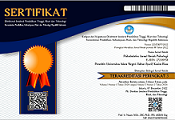Keinginan untuk Tetap Bertahan Gen Z: Peran Kesejahteraan di Tempat Kerja
Abstract
Keywords
Full Text:
PDFReferences
Agus, A., & Selvaraj, R. (2020). The mediating role of employee commitment in the relationship between quality of work life and the intention to stay. Employee Relations, 42(6), 1231–1248. https://doi.org/10.1108/ER-07-2019-0292
Chen, H. M., Liu, C. C., Yang, S. Y., Wang, Y. R., & Hsieh, P. L. (2021). Factors related to care competence, workplace stress, and intention to stay among novice nurses during the coronavirus disease (Covid-19) pandemic. International Journal of Environmental Research and Public Health, 18(4), 1–10. https://doi.org/10.3390/ijerph18042122
Deloitte. (2022). The Deloitte Global 2022 Gen Z & Millenial Survey.
Dwiputri, R., Rumijati, A., & Utama, E. K. (2022). The Effect of Organizational Climate on Intention to Stay with Employee Engagement as Intervening Variable. Jurnal Manajemen Bisnis Dan Kewirausahaan, 2(3), 1–11. https://doi.org/10.22219/jamanika.v2i03.22750
Fasy, J. (2018). Generational Differences in the Workplace: A Meta-Analysis. https://commons.pacificu.edu/spp/1413
Gatrell, C., Ladge, J. J., & Powell, G. N. (2022). A Review of Fatherhood and Employment: Introducing New Perspectives for Management Research. In Journal of Management Studies (Vol. 59, Issue 5, pp. 1198–1226). John Wiley and Sons Inc. https://doi.org/10.1111/joms.12771
Intan Nirmala Sari. (2022, September 17). Survei: 77% Tenaga Kerja Profesional Indonesia Pertimbangkan Resign. Katadata.Co.Id.
Komagata, M., Takemura, Y., Ichikawa, N., Takehara, K., & Kunie, K. (2020). Quality of work among part-time nurses and its relationship to job satisfaction and work values: A cross-sectional study. Nursing and Health Sciences, 22(4), 1010–1021. https://doi.org/10.1111/nhs.12760
Kyndt, E., Dochy, F., Michielsen, M., & Moeyaert, B. (2009). Employee retention: Organisational and personal perspectives. Vocations and Learning, 2(3), 195–215. https://doi.org/10.1007/s12186-009-9024-7
Loft, M. I., & Jensen, C. S. (2020). What makes experienced nurses stay in their position? A qualitative interview study. Journal of Nursing Management, 28(6), 1305–1316. https://doi.org/10.1111/jonm.13082
Mowday, R. T., Steers, R. M., & Porter, L. W. (2016). The Impact of Job Satisfaction on Turnover Intention by the Existence of Organizational Commitment, and Intent to Stay as Intermediates Variables Using approach PLS in Sample Worker Department of Transport Saida. Management, 6(6), 198–202.
Parker, G. B., & Hyett, M. P. (2011). Measurement of well-being in the workplace: The development of the work well-being questionnaire. Journal of Nervous and Mental Disease, 199(6), 394–397. https://doi.org/10.1097/NMD.0b013e31821cd3b9
Pressley, C., & Garside, J. (2023). Safeguarding the retention of nurses: A systematic review on determinants of nurse’s intentions to stay. In Nursing Open. John Wiley and Sons Inc. https://doi.org/10.1002/nop2.1588
Rani, & Samuel. (2016). A study on Generational differences in work values and person-organization fit and its effect on turnover intention of Generation Y in India. Management Research Review, 19(12), 1695–1719.
Shin, Y., Hur, W. M., Park, K., & Hwang, H. (2020). How managers’ job crafting reduces turnover intention: The mediating roles of role ambiguity and emotional exhaustion. International Journal of Environmental Research and Public Health, 17(11), 1–18. https://doi.org/10.3390/ijerph17113972
Shockley, K. M., Smith, C. R., & Knudsen, E. A. (2017). The Wiley Blackwell Handbook of the Psychology of Recruitment, Selection and Employee Retention.
Suifan, T. S., Diab, H., Alhyari, S., & Sweis, R. J. (2020). Does ethical leadership reduce turnover intention? The mediating effects of psychological empowerment and organizational identification. Journal of Human Behavior in the Social Environment, 30(4), 410–428. https://doi.org/10.1080/10911359.2019.1690611
Tetteh, S., Dei Mensah, R., Opata, C.N. and Mensah, C.N. (2022), Service employees’ workplace fun and turnover intention: the influence of psychological capital and work engagement. Management Research Review. 45(3), 363-380. https://doi.org/10.1108/MRR-12-2020-0768
Wei, W., Yu, Y., & Gao, G. (2022). Investigating Learners’ Changing Expectations on Learning Experience in a MOOC of Professional Translation and Interpreter Training. SAGE Open, 12(4). https://doi.org/10.1177/21582440221134577
Weerarathne, R. S., Walpola, M. D. C. P., Piyasiri, A. D. W. D., Jayamal, I. A. U. M., Wijenayaka, T. H. P. C., & Pathirana, G. Y. (2022). ‘Leave or remain’: intentions of Gen X and Y employees. Quality and Quantity. https://doi.org/10.1007/s11135-022-01456-z
Yousaf, A., Shaukat, R., & Umrani, W. A. (2021). Linkages between group level task conflict and individual level outcomes in non-routine technical jobs. International Journal of Conflict Management, 32(1), 158–176. https://doi.org/10.1108/IJCMA-08-2019-0128
Yu, H., Huang, C., Chin, Y., Shen, Y., Chiang, Y., Chang, C., & Lou, J. (2021). The mediating effects of nursing professional commitment on the relationship between social support, resilience, and intention to stay among newly graduated male nurses: A cross-sectional questionnaire survey. International Journal of Environmental Research and Public Health, 18(14). https://doi.org/10.3390/ijerph18147546
Zhang, Y., Li, X., Yan, D., Wen, F., & Zhang, Y. (2020). Nurses’ intention to stay: The impact of perceived organizational support, job control and job satisfaction. Journal of Advanced Nursing, 76(5), 1141–1150. https://doi.org/10.1111/jan.14305
DOI: http://dx.doi.org/10.24014/pib.v5i1.24542
Refbacks
- There are currently no refbacks.
Redaksi Psikobuletin: Buletin Ilmiah Psikologi
Publisher: Universitas Islam Negeri Sultan Syarif Kasim Riau
Jl. H.R. Soebrantas Km. 15.5 No. 155 Gedung Fakultas Psikologi UIN Sultan Syarif Kasim Riau Kel. Tuahmadani Kec. Tampan Pekanbaru - Riau 28293.
E-mail : psikobuletin@uin-suska.ac.id / Website :http://ejournal.uin-suska.ac.id/index.php/Psikobuletin
Psikobuletin : Buletin Ilmiah Psikologi by Fakultas Psikologi is licensed under a Creative Commons Attribution 4.0 International License.



31.png)





